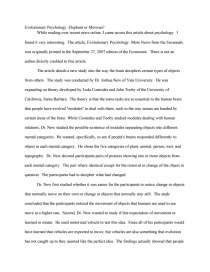Evolutionary Psychology: Elephant or Minivan?
Essay by review • January 16, 2011 • Essay • 585 Words (3 Pages) • 1,310 Views
Evolutionary Psychology: Elephant or Minivan?
While reading over recent news online, I came across this article about psychology. I found it very interesting. The article, Evoluitonary Psychology: More News from the Savannah, was originally printed in the September 27, 2007 edition of the Economist. There is not an author directly credited to this article.
The article details a new study into the way the brain deciphers certain types of objects from others. The study was conducted by Dr. Joshua New of Yale University. He was expanding on theory developed by Leda Cosmides and John Tooby of the University of California, Santa Barbara. The theory is that the some tasks are so essential to the human brain that people have evolved "modules" to deal with them, such in the way senses are handed by certain areas of the brain. While Cosmides and Tooby studied modules dealing with human relations, Dr. New studied the possible existence of modules separating objects into different mental categories. He wanted, specifically, to see if people's brains responded differently to object in each mental category. He chose the five categories of plant, animal, person, tool, and topography. Dr. New showed participants pairs of pictures showing one or more objects from each mental category. The pair where identical except for the removal or change of the object in question. The participants had to decipher what had changed.
Dr. New first studied whether it was easier for the participants to notice change in objects that normally move on their own or change in objects that normally stay still. The study concluded that the participants noticed the movement of objects that humans are used to see move at a higher rate. Second, Dr. New wanted to study if this expectation of movement or learned or innate. He used motorized vehicle to test this idea. Since all of his participants would have learned that vehicles are expected to move, but vehicles are also something that evolution has not caught up to they seemed like the perfect idea. The findings actually showed that people noticed animal movement at a higher rate then motorized car, even when that animal was something that most people would not see in everyday life. This led Dr. New to conclude that there is an animal-monitoring module that is innate to all humans even those that will never experience certain animals.
I really found this
...
...

